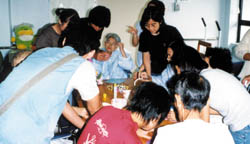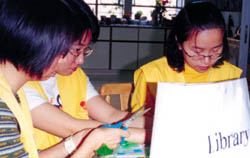 Online
Edition
Online
Edition | From
the editor Letters to the editor Milestone Answerman Periscope Campus Life Social Issues People Photo Features Education Channel Culture & Leisure Science |
| Last
Issue Archive |
| About
Varsity Advertise Media Links CUHK homepage JLM homepage |
Also in Social Issue
Gay men in Hong Kong
Related
Links
The
University of Hong Kong
The Chinese University of Hong Kong
![]()
University
students as hospice care volunteers
Breathing life into dying patients' hearts
By Wingki Kwok
Being
at death’s door is an unwelcome experience.
Serving
dying people is a treasured experience.
Pulling
dying patients away from sadness and loneliness, voluntary hospice care
work provides university students chances to energise care workers in
hospitals.
Hospice
care aims at giving care to dying patients and their relatives through
hospital visits and counselling services.
Mr.
Dick Yip, a fresh university graduate, is a hospice care volunteer.
He
became a hospice care volunteer when he was a Year 3 psychology student at
the University of Hong Kong.
An
unpleasant experience motivated him to join the group.
Said
he: “My mother was once a cancer patient. I know it is hard to face
death.
“During
the treatment, the doctor found that she was very ill and the treatment
was simply a waste of time and resources.
“The
doctor immediately tore up the permit for treatment in front of us and
asked my mother to go home and wait. It made us feel hopeless.”
He
thought that the hospital staff only cared about patients’ physical
needs but not their psychological being. His experience made him a hospice
care volunteer.
Life
is a bowl of cherries for most university students. Many of them have not
even had the experience of suffering.
Working
as a hospice care volunteer provides a chance for young people to learn
about pain from dying patients.
Mr.
Yip said serving dying patients is different from ordinary volunteer work.
Whenever
he goes to the hospital, he encounters a completely different atmosphere
from that in the campus.
“On
the campus, it is full of laughter, while the hospital is silent and
lifeless,” he said.
This
contrast makes him think of the meaning of life — something university
students are not likely to think about.
This
volunteer work provides a chance for him to understand misery.
Miss
Katie Yeung is a Year 2 philosophy student at The Chinese University of
Hong Kong. She is a participant in the short-term hospice programme. She
agreed with Mr. Yip.
Said
she: “Usually I seldom think of death. When I saw weak patients who had
difficulties in communication, I learnt the pain of walking towards the
end of life.
“I
should treasure life and live with a positive attitude. Though I am still
afraid of death. I know what I should do if I encounter the death of my
relatives.”
Mr.
Yip said university students easily get lost in a rich and joyful school
life and forget what they are doing.
Said
he: “We often have a lot of desires, while the wish of the dying
patients might only be as simple as having a good sleep.
“I
think about what I am living for after learning patients’ pain. Playing
and enjoyment should not be the aims of life.”
Their
major responsibility is to visit hospitals. When visiting patients, Mr.
Yip prefers stroking them to chatting.
In
doing so, he believes that it strenghtens patients’ will to combat
diseases.
Said
he: “Since we are more energetic, we can give them a feeling of
liveliness and warmth from our powerful hands.
“Also,
it shows them that we are not afraid of them.”
Though
Mr. Yip said that he encourages his friends to join, not all students are
willing.
He
said some students refuse to join because they are worried that being with
dying patients would upset them.
The
Comfort Care Concern Group, the first organisation to provide voluntary
hospice care in Hong Kong, teaches volunteers how to handle their
emotions.
Mr.
Eddie Chan is the programme coordinator of the group.
He
said that more university students are becoming hospice care volunteers.
Many students actually request further participation once they have
joined.
As
young people often have little knowledge about hospice care work, the
group holds a short-term programme annually called “Summer Youth — A
Journey And Energetic Life” — targeting people aged
17 to 24.
Mr.
Chan said the programme is effective. Feedback from participants, patients
and their families is good.
He
said many patients appreciate the volunteers’ creativity. Some even
treatd the volunteers as their own children.
Said
Miss Yeung: “During one of our hospital visits, a patient suddenly cried
at the time we left and told us her story. I can see her loneliness.
“We
had made them feel that they were being taken care of and they became
happier. I was satisfied after helping them.”
Prof.
Joyce Ma is chair of the Department of Social Work at The Chinese
University of Hong Kong.
She
said that although the need of hospice care in Hong Kong is great and it
generates positive feedback, university students might refuse to join
because they think that it is useless to them.
Said
she: “University students are usually realistic. It might be difficult
for them to give up their valuable time to serve dying patients without
any returns.”
She
said serving dying patients is actually rewarding to university students.
It is helpful in personal development, especially in value establishment.
Mr.
Yip explained his thinking at the time he signed up for voluteer work.
“My
only consideration for joining the group was time management,” he said.
Said
he: “I wondered whether I should treasure my wonderful school life or
spend time in volunteer hospice care work.”
He
eventually chose the latter.
“A
dying patient may leave shortly. I choose to serve that person now,”
said Mr. Yip. ![]()
Being
a good hospice care volunteer
Besides having
patience and an outgoing personality, a good hospice care volunteer should
be kind, mature and brave, as one may have to face many unpleasant
situations.
Apart from these, Mr. Eddie Chan of the Comfort Care Concern Group said
that volunteers must not be psychologically too involved in the work.
Said Mr. Chan: “If the volunteers are too intense, they may be affected
emotionally, or sadness will be aroused.
“Besides, some volunteers may try to bear the family burdens of
patients, say bearing their financial burdens or taking care of their
children.
“This
would lead to unhealthy results.”
In this situation, volunteers should pass the responsibility to other
professionals.
“Our only role is to comfort them,” said Mr. Chan. “Volunteer work
should always be in present tense.” ![]()
|
Courtesy
of The Comfort Care Concern Group
 University students serve dying patients in the programme “Summer Youth”. |
|
Courtesy
of The Comfort Care Concern Group
 University students prepare gifts for dying patients to cheer them up. |